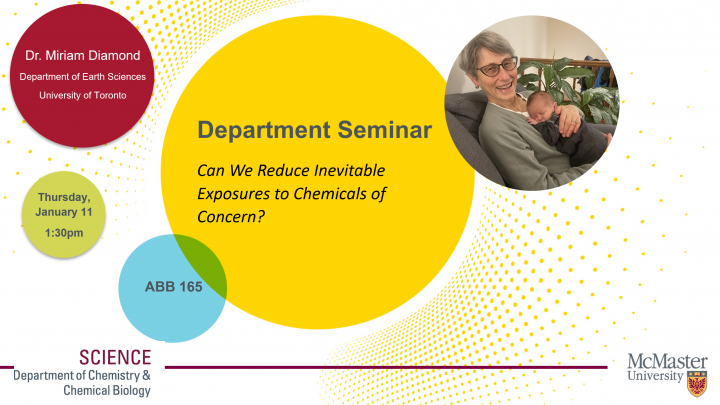Department Seminar: Dr. Miriam Diamond
Jan 11, 2024
1:30PM to 2:20PM

Date/Time
Date(s) - 11/01/2024
1:30 pm - 2:20 pm
Title: Can we reduce inevitable exposures to chemicals of concern?
Date: Thursday January 11, 2024
Time: 1:30-2:20pm
Room: ABB 165
Host: Dr. Joseph Okeme
Abstract: Populations are inevitably and inequitably exposed to chemicals of concern which is one cause of associated population-wide adverse health effects. The inevitability of exposure comes from basic thermodynamic theory coupled with high chemical production volumes, “chemical intensification”, and human activities. Evidence of this inevitability is strongest for high production volume chemicals used in myriad applications. The rate at which new chemicals are introduced to markets outstrips the ability for assessment conducted under chemical management programs to even confidently determine which chemicals are of concern. It is unlikely, if not impossible, that we can “benign by design” our way out of widespread exposures to chemicals of concern, including those we don’t even know are of concern. Given these trends and the need to exert some semblance of precaution, solutions range from chemicals management according to hazard and not risk, the need to turn towards arguments of “sufficiency” amongst those of high income for demand-side management, and putting a cap on production for supply-side management.
Short Biography: Miriam L. Diamond is a professor at the University of Toronto. For over 30 years, her research has advanced knowledge of chemical emissions, their transport processes, and resultant human and ecological exposure, and chemicals management policy. Diamond’s science and policy research has been published in over 200 peer-reviewed articles and chapters, in addition to receiving media attention.
Prof. Diamond is the Vice-Chair of the International Panel on Chemical Pollution, the chemicals and waste expert of the Scientific and Technical Advisory Panel of the Global Environment Facility, and is soon to be named an “Environment Commissioner” by the Earth Commission under the Global commons Alliance. She is a Fellow of the Royal Society of Canada, Royal Canadian Geographical Society, and the Society of Environmental Toxicology and Chemistry and just stepped down as an Associate Editor of the journal Environmental Science and Technology and was the co-chair of the Canadian Chemical Management Plan Science Committee from 2017 to 2021.
